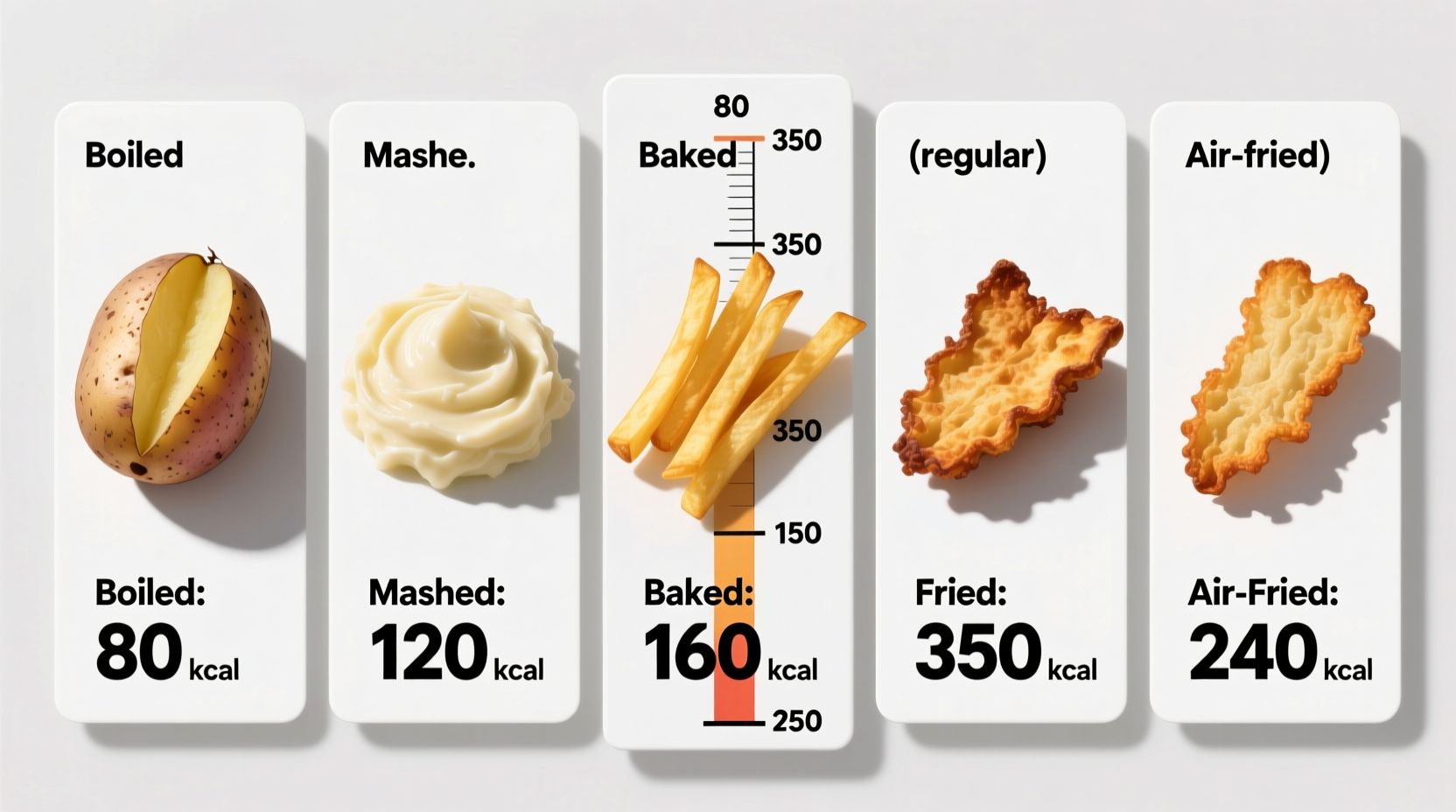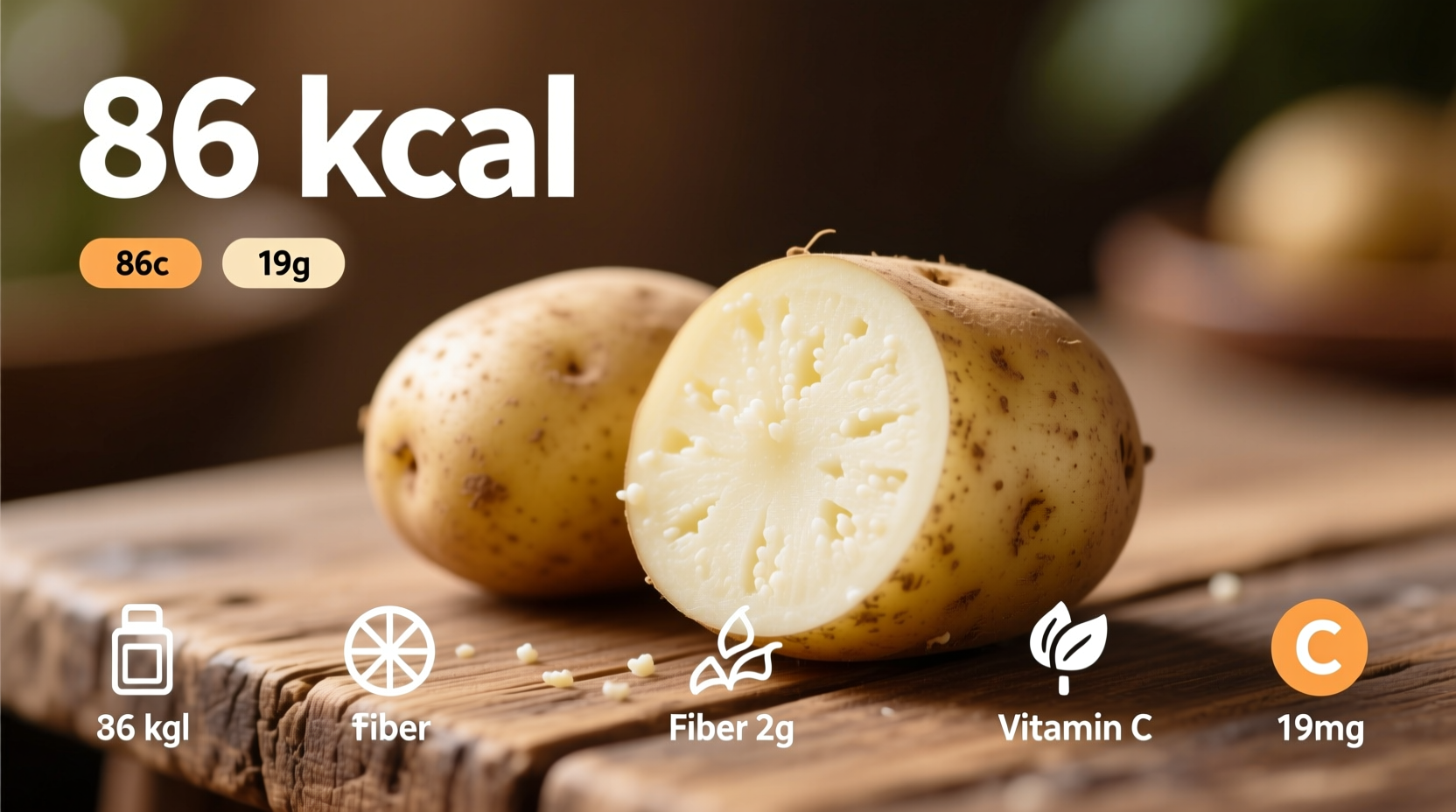Understanding Potato Calories: Your Complete Guide
When tracking your daily nutrition, knowing the precise calorie content of staple foods like potatoes is essential. This guide delivers evidence-based information about potato calories across different varieties and preparation methods, helping you make informed dietary choices without sacrificing flavor or satisfaction.
Basic Potato Calorie Facts You Need to Know
Potatoes often get misunderstood in nutrition discussions. The reality is they're naturally low in calories while providing valuable nutrients. According to USDA FoodData Central, the base calorie count depends primarily on potato variety and weight rather than the potato itself being "high" or "low" calorie.
| Potato Type | Weight (g) | Calories (Boiled) | Calories (Baked) |
|---|---|---|---|
| Russet | 150 | 110 | 130 |
| Yukon Gold | 150 | 115 | 135 |
| Red Potato | 150 | 112 | 132 |
| Sweet Potato | 150 | 135 | 150 |
This comparison of potato calories by type reveals minimal differences between common varieties when prepared simply. The USDA National Nutrient Database confirms that the cooking method affects calorie content more significantly than the potato variety itself.
How Preparation Methods Transform Potato Calories
Your cooking technique dramatically impacts the final calorie count. Understanding these differences helps you enjoy potatoes while managing your nutritional goals:
- Boiled potatoes: Retain water content, resulting in the lowest calorie preparation (approximately 70-80 calories per 100g)
- Baked potatoes: Slightly higher concentration of calories due to water loss during cooking (about 90 calories per 100g)
- Fried potatoes: Absorb significant oil, increasing calories to 300+ per 100g (source: National Center for Biotechnology Information study on cooking methods)
- Air-fried potatoes: Use 70-80% less oil than traditional frying, reducing calories substantially while maintaining texture

Practical Strategies for Managing Potato Calories
Contrary to popular belief, potatoes can be part of balanced nutrition plans when approached strategically. Research from Harvard T.H. Chan School of Public Health shows that the context of potato consumption matters more than the potato itself (source).
Portion Control Techniques
Measuring your potato portions accurately prevents unintentional calorie overconsumption. A medium potato (about the size of a computer mouse) provides approximately 110-130 calories. Using kitchen scales initially helps develop visual estimation skills for consistent portioning.
Smart Flavor Enhancement Without Extra Calories
Professional chefs like Antonio Rodriguez emphasize that maximizing flavor without added calories comes down to technique:
- Roast potatoes with herbs instead of oil for concentrated flavor
- Add vinegar during boiling to enhance natural sweetness
- Use citrus zest to brighten potato dishes without extra fat
- Try the "steam-then-chill" method to increase resistant starch content
Debunking Common Potato Calorie Myths
Several misconceptions persist about potatoes and calories. Let's examine the evidence:
Myth: Potatoes cause weight gain
Reality: A comprehensive review published in the Journal of Nutrition and Metabolism found that when prepared healthily and consumed in appropriate portions, potatoes don't inherently cause weight gain. The issue typically stems from high-calorie preparation methods and excessive portions.
Myth: Sweet potatoes are always lower in calories than white potatoes
Reality: While sweet potatoes contain slightly more calories per serving, they also provide significantly more vitamin A. The difference is minimal (about 25 extra calories per medium potato), making both options viable depending on nutritional priorities.
Integrating Potatoes into Different Dietary Approaches
Whether you're following a Mediterranean diet, managing diabetes, or pursuing athletic performance goals, potatoes can play a strategic role:
- For blood sugar management: Cool cooked potatoes increase resistant starch, lowering glycemic impact by up to 25% (American Journal of Clinical Nutrition)
- For athletic performance: Potatoes provide ideal carbohydrate timing 2-3 hours before endurance activities
- For weight management: Include potatoes in meals with protein and fiber to increase satiety and reduce overall calorie intake
Maximizing Nutritional Value While Minimizing Calories
The Academy of Nutrition and Dietetics recommends these evidence-based strategies for getting the most nutritional benefit from potatoes while managing calorie intake:
- Leave skins on to increase fiber content by 50% and boost vitamin retention
- Cool potatoes after cooking to increase resistant starch by 300-400%
- Pair potatoes with vinegar-based dressings to lower post-meal blood sugar spikes
- Choose smaller portions of higher-calorie preparations (like roasted) and balance with lower-calorie vegetables
Frequently Asked Questions
Here are answers to the most common questions about potato calories based on current nutritional science:











 浙公网安备
33010002000092号
浙公网安备
33010002000092号 浙B2-20120091-4
浙B2-20120091-4